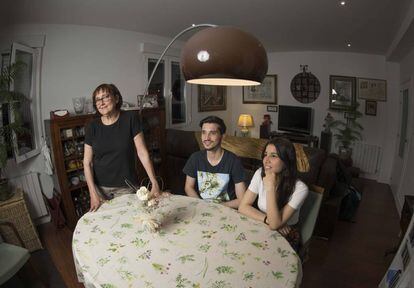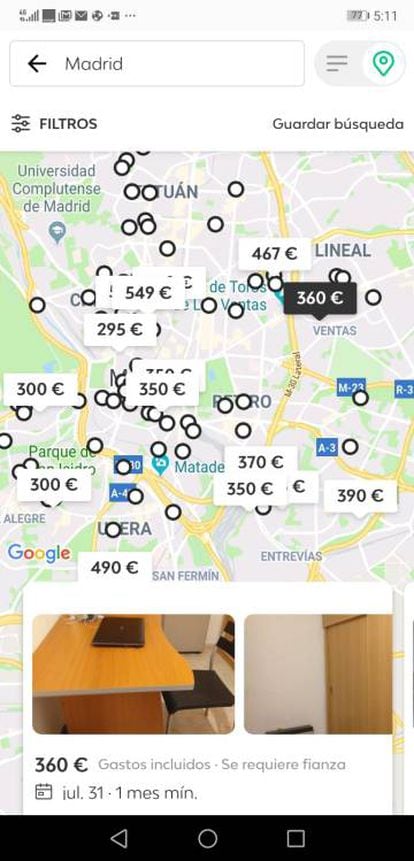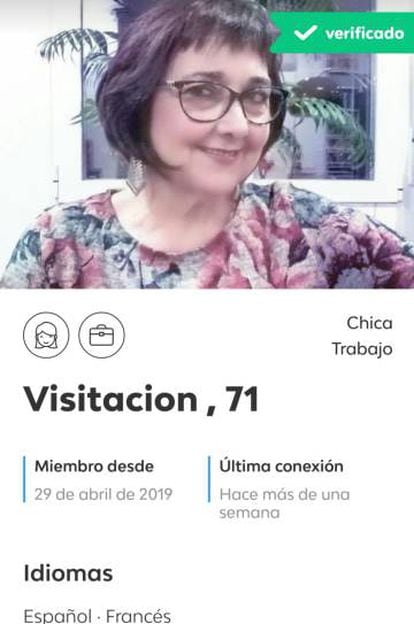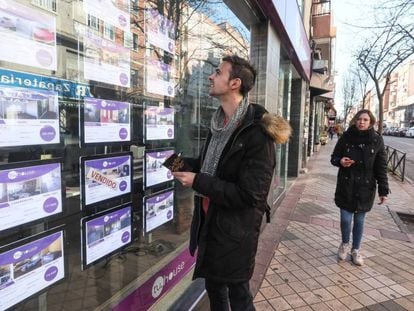The “Tinder-style” app that reveals how flat-sharing is no longer just for millennials
Whether it’s to supplement their pensions, combat the effect of rising rents or simply for an adventure, seniors are opting to seek roommates, according to data from the Badi service


She may be 71 but Visitación Gracia, otherwise known as Visi, has just started to share her apartment with strangers. For the past two months, she has rented a room in her Prosperidad home to a young Venezuelan couple she found through Badi, a smartphone app that works, as she says, “like Tinder for roommates.”
Badi’s popularity among the older generation has taken the app’s founders by surprise
Visi has a good pension but she uses it to support one of her children. “What retired person doesn’t have a family member to help?” she asks, adding that the change is simply a sign of the times
Badi’s popularity among the older generation has taken the app’s founders by surprise. When it was launched in 2015, they were going after millennials – students or young people on low salaries. Their target market was reflected in the advertising that lined the walls of Metro stations in Madrid and Barcelona, but this has been modified for their latest campaign, which shows people of all ages using the app.
“Some people say they are too old for this while others keep abreast of developments,” says the most-recent TV ad, which shows a mature woman sticking her tongue out for a selfie with a younger boy.

The difference between Badi and other roommate apps is that Badi reveals the users’ age, a piece of data that is required on registration, making it easy to detect that sharing an apartment with strangers is no longer just a part of a young person’s lifestyle. With more than 1.5 million users registered in Europe, Badi’s big data indicates that 7.5% of those placing ads for roommates in Madrid and Barcelona are aged between 51 and 65.
“We thought that 100% of our public would be young but that clearly hasn’t been the case,” says Ignasi Giralt, Badi’s general director in Spain. “There is an increasing number over the age of 35.”
The average age of those offering rooms is 33 and the average age of those seeking rooms is 30. Around 21% of users in Madrid and Barcelona are aged between 35 and 45.
Part of Badi’s success is due to soaring city rents, which make renting an entire apartment impossible
Sky-high rents
Giralt explains that part of Badi’s success is due to soaring city rents, which make renting an entire apartment impossible. The average rent in Madrid has gone up by €319 in four years while salaries have scarcely risen at all.
The head of Badi also believes that its success reflects the need for flexibility that comes with modern living and the fact that the old attitudes toward apartment sharing have been swept aside.
Another fundamental factor Giralt flags up is the pace of urban growth. Nowadays, 55% of the world’s population lives in cities, a figure the United Nations predicts will rise to 68% by 2050. Given this situation, sharing apartments with strangers will become, for many, the only option.
But while Badi’s more senior users are motivated by financial factors, the need for company also comes into play. Visi, for example, has rented a room as much for the experience as for the money. An executive at a pharmaceutical firm during her professional life, she is far from badly off, as the photos on her wall – skiing trips, weddings, family celebrations – indicate. While her friends regard her choice as weird since sharing your apartment is still considered the domain of those struggling financially, Visi waded through an avalanche of responses before she chose Liseth Quintero, 24, and her husband Reynaldo Homen, 25.
Meanwhile, her Venezuelan roommates had no choice but to share. They are both doctors who arrived in Spain nine months ago but who will have to go through the long process of standardizing foreign qualifications before they can practice their profession.

Having found out about Badi from Venezuelan friends who moved to Spain before them, Liseth and Reynaldo pay Visi €600 for a room. They are surprised by how little people in Spain earn, considering how expensive it is. “A third goes on rent. It’s madness,” says Liseth.
“I fell in love with them,” says Visi, who was helped to download the Badi app by the girl who cares for her aunt – “an expert in everything to do with phones,” she says.
Living with dignity
With 1.2 million people over the age of 65 living in Madrid – 18% of the population – there are a number of initiatives to encourage the elderly to share their homes. One is Hogar y Café from the Pilares Foundation, which helps seniors with limited financial resources.
Funded by Madrid’s regional government, the program was established this year after a study conducted by the foundation found that many of the elderly in a compromised financial situation were having trouble finding a place to live. In the Madrid region, the average pension in 2017 was €1,263 and the widow’s pension, €737, according to the National Statistics Institute. Meanwhile, the average rent in the region is €1,124 for an average-sized apartment of 76m2, according to the online property platform Idealista.
The idea behind the foundation’s program is that the roommates would be from the same generation. Currently, it is still at the interview stage with ads up in senior centers around Madrid. “Sharing an apartment is an option for many among the elderly who want to continue living with dignity,” says Conchi García, the initiative’s coordinator.
Loneliness is another of the problems the foundation has identified. According to the study, many of those interviewed complained about the lack of support within the community. “Before, there was a lot of life with the neighbors,” said one interviewee. “Now you don’t know the neighbors.”
Many of those signing up to the program are retired and struggling to pay the rent with their pensions, such as Consuelo Vicente, 64, who lives in Malasaña and whose rent has gone up significantly in recent years. “As pensions don’t amount to much, it is good to pool resources, and you also get company,” she says, adding that she is waiting for the program to assign her potential roommates.
For many, it will be a novelty to share their living arrangements with a stranger, injecting freshness into their lives. Visi, for example, sees it as an adventure. “Who would have thought?” she laughs. “You just never know where life will take you!”
English version by Heather Galloway.












































